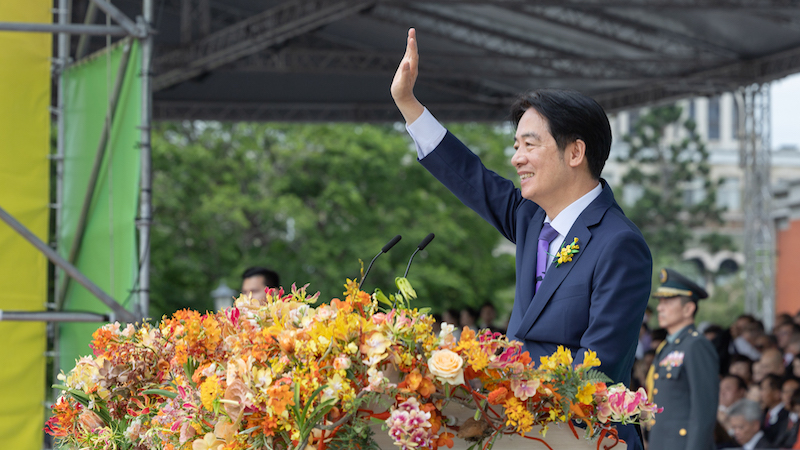
By Hiro Fu
Ahead of his inaugural overseas visit to Pacific allies — the Marshall Islands, Tuvalu and Palau — Taiwanese President Lai Ching-te declared that his trip marked the beginning of a ‘new era’ for Taiwan’s values-based diplomacy, centred on shared democratic ideals, mutual prosperity and peace-building. This values-based approach constitutes one of the three pillars of the Lai administration’s comprehensive diplomatic strategy, alongside alliance-based diplomacy and economic and trade diplomacy.
Together, these pillars aim to ensure mutual benefits for Taiwan and its global partners while advancing shared values. But a renewed emphasis on shared values emerges at a time when the relevance of values in diplomacy is increasingly uncertain.
With Donald Trump’s return to the White House, the United States’ foreign policy is more likely to focus on national interest and security considerations.
Even if Taiwan’s diplomatic shift proves largely rhetorical, moving away from what one could argue to be implicit, long-present transactionalism, its promotion could appear at odds with the deprioritisation of shared ideals among US allies and partners, as they direct attention towards the demands of more transactional relationships. In this scenario, Taiwan’s values-based diplomacy might appear out of place.
But the values-based approach remains both a pragmatic and strategic choice for Taiwan. Historically, this strategy has broadened Taiwan’s avenues for international engagement. It highlights Taiwan’s strengths, not only as a democracy in contrast to China’s authoritarianism, but also its role as a reliable partner in advancing regional stability, driving economic innovation and contributing to global development. Reliability is firmly rooted in the democratic values Taiwan promotes.
Advancing ties based on shared values is not new for Taiwan. In 2000, then president Chen Shui-bian pioneered the approach, branding his inaugural trip to diplomatic allies in Central America and Africa as the ‘tour of democratic diplomacy and friendship’. Similarly, former president Tsai Ing-wen championed the approach from 2016–24, expanding engagements with like-minded partners beyond formal diplomatic allies. Visiting leaders, such as Czech Senate President Milos Vystrcil and US Speaker Emerita Nancy Pelosi, have emphasised their support for Taiwan’s shared commitment to democracy.
The emphasis on shared values underlines the dichotomy between democracy and authoritarianism. Whereas respect for the rule of law and the protection of human rights are central to Taiwan’s democracy, China’s authoritarian regime utilises its institutions and legal framework to suppress the rights of its peoples. Each diplomatic engagement with Taiwan presents a choice to align with democratic values over authoritarian control and repression.
The antithesis of Taiwan’s values-based approach is one rooted in transactionalism, such as using financial incentives, aid and investments to secure and maintain diplomatic recognition. Under the Chen and Tsai administrations, ‘dollar diplomacy’, among other more pragmatic initiatives, played a complementary role alongside the emphasis on shared values. It was not until 2023, when Honduras severed ties with Taiwan to establish diplomatic relations with China, that Tsai publicly acknowledged the limitations of dollar diplomacy. Taiwan simply cannot outmatch China’s economic statecraft.
Though Taiwan may not match the economic resources of the world’s second-largest economy, the partnerships it offers — based on transparency, mutual respect and shared values — are equally beyond China’s reach. These principles set Taiwan apart, offering an alternative focused on equitable, trust-based collaboration rather than the coercion and asymmetrical dependency often associated with China’s approach. Complementing its values-based diplomacy, the Lai administration now aims to leverage Taiwan’s strengths in semiconductors, artificial intelligence and other key sectors through its economic and trade diplomacy.
Beyond economic considerations, Taiwan’s diplomatic allies also face the growing challenge of navigating the perils of US–China great power rivalry when deciding whether to maintain ties with Taipei or switch to Beijing. China’s expanding influence over the past decades in the Pacific, Latin America, the Caribbean and Africa — regions where Taiwan’s allies have been concentrated — has become another major factor explaining why many have chosen to cut ties with Taiwan.
Values-based diplomacy addresses the challenges of security and geopolitical competition, but not on its own. The Lai administration’s alliance-based diplomacy seeks to build coalitions with democratic allies that share similar security interests, including South Pacific partners, the United States, Japan and Australia. Inspired by the United States’ maritime containment strategy of island chains, the Lai administration proposes to build ‘democratic island chains’, alliances not only grounded in shared democratic values but also commitment to regional security.
Despite declaring a ‘new era’ for Taiwan’s values-based diplomacy, the Lai administration has not introduced any fundamentally new concepts. The core elements of its three-pillared comprehensive diplomatic strategy — emphasising shared values, trade and alliance-building — have been a feature of its diplomacy since at least 2000.
But Lai’s decision to make shared democratic values the centrepiece of his administration’s diplomatic strategy, despite the opportunity to chart a different course as a newly elected leader, reflects a deliberate and strategic choice. It’s a choice that seeks to leverage Taiwan’s assets and strengths even amid the global uncertainty that a second Trump presidency could entail.
- About the author: Hiro Fu is one of the founding editors of the Taiwan Weekender, a weekly political newsletter on Taiwan and the world.
- Source: This article was published by East Asia Forum